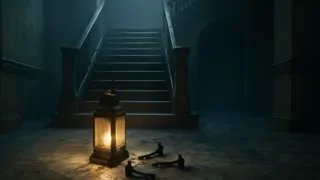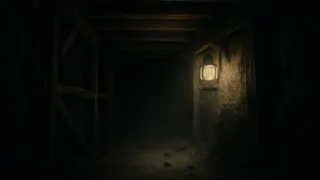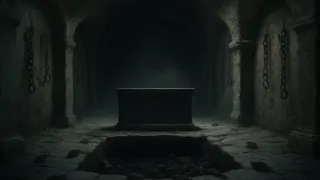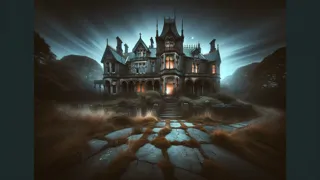Introduction
Julian Ashcroft’s first view of Ashcroft Manor came beneath a ragged sky, the distant rolling hills of Massachusetts blurred by mist. The estate rose from the hilltop like a specter, its turrets and gables silhouetted against swollen clouds. He had expected inheritance paperwork and dusty family portraits. He had not expected the hush—an impossible hush that seemed to swallow every breath, every footstep, as he crossed the overgrown drive. Tall pines bent in an unseen wind, and vines crept along stone mullions as though drawn by a secret pulse within the ancient bricks. The heavy oak door resisted his push, groaning open to admit him into a grand foyer whose marble floors were mottled with time. Candlesticks lay overturned, their wax hardened into grotesque stalagmites; on the walls, faded tapestries depicted lineages he hardly recognized. The air was thick with the musk of mildew and wood rot, tinged by a colder undercurrent that prickled his skin. Somewhere deep inside the house, something raked against plaster. Julian paused, heart pounding. He told himself it was the settling of old wood, the rumble of distant rain—anything but the stirring of something alive and hungry behind those silent walls.
Inheritance and Arrival
Julian studied the formal letter of inheritance by candlelight. It described deeds, ledgers, and a modest endowment, but it hinted nothing of the manor’s darker reputation—whispers of vanished heirs and murky scandals long buried in county records. He set the letter aside to examine the wrought-iron key, its bit intricately fashioned into the shape of a grotesque rat. The moment he fitted it into the lock, the house seemed to inhale around him, shutters rattling in protest. In that thunderous silence that followed, every footstep echoed like a tolling bell. He explored room by room: a study with ash-stained bookshelves, a library of dust-blanketed tomes, and a music parlor where a cracked harp lay abandoned. With each corridor he traversed, Julian felt the walls flex, as though alive. Floors creaked beneath him but revealed no hidden voids. He dismissed a fleeting sense of motion out of the corner of his eye—probably a loose shutter or a stray rat disturbed by his lantern. Yet, when he entered the drawing room, the temperature dropped so sharply his breath billowed before him. On a side table, he found his great-uncle’s photograph: a pallid man with deep-set eyes and a haunted expression. In the distance, a soft scratching began, tremulous and low. Julian’s pulse quickened. He reached for his lantern. "Hello?" he whispered. Only the scratching answered, like nails on plaster, coming closer.

His first night in the manor was broken by twitching dreams. He imagined scratching beneath his bed, a thousand tiny claws scuttling in the dark. When morning came, he felt cold and hollow. Yet the house beckoned, its corridors inviting him deeper. Over breakfast in a dusty dining hall, he found no silverware—only tarnished candleholders and cracked china. He readied himself to unearth whatever lay hidden in this inheritance, unaware that in doing so he would unseal a door to unspeakable terror. The rats, he realized too late, were merely a beginning.
Echoes in the Hallways
Each hallway in Ashcroft Manor stretched like a labyrinth of sighs. Julian traced tapestry seams to find secret panels—legends claimed hidden rooms—but found only moth-eaten fabric and rotten wood. The rats’ scratching grew more insistent, emanating from walls that shivered when he tapped them. He tried to rationalize: old pipework, wind in the eaves, mice nesting in empty cabinets. Yet logic wilted beneath the weight of night. One afternoon, he discovered a hatch beneath the floorboards of the nursery: a trapdoor secured by an iron latch. Inside lay a narrow shaft that descended into utter blackness. He retrieved a lantern and flashlight, and with trepidation, climbed down. The air in the crawlspace reeked of damp earth and something fouler—an amniotic stench of rot and decay. The walls were lined with old planks, behind which faint movements teased his vision. He pressed an ear to the boards and heard skittering, squealing voices, as though a colony of vermin whispered secrets of the house’s past.

He emerged unsettled. Research in the dusty library revealed that Ashcroft ancestors were rumoured to have dabbled in occult rites—offered sacrifices to ensure the family’s fortune. Mentioned only in footnotes, it suggested an ancient lineage stained by guilt. Julian found a ledger describing the disappearance of two children from the orphanage next door; their likenesses matched portraits in the east wing. The mansion’s very walls were impregnated with sorrow and blood. That evening, he tried to lock away the nursery entrance but the latch twisted in his grip. The trapdoor was gone. In its place, the floor looked seamless—no seam, no wood grain, only cold stone. A tremor of fear ran through him. Beneath the manor’s veneer, something pulsed, alive and hungry. Julian lit candles in the hallway, their flicker trembling on the walls. Shadows writhed. And as midnight approached, the scratching began anew, relentless and filled with malice.
Descend into Darkness
Rain hammered the roof as Julian confronted the house’s heart. In the main library he found a hidden lever carved into an antique globe stand. The walls moaned in response as a section of bookshelves slid aside, revealing a spiral staircase descending into utter blackness. Armed with candle and lantern, he began his descent, each step echoing like a death knell. The lower chamber was vast, hewn from bedrock—an ancient crypt beneath the manor. Petrified rat skulls and fragments of bone littered the floor. Rusted chains hung from arched alcoves. At the far end, a circular pit gaped like an abyss. The scratching here was deafening, as if thousands of claws scrabbled at the stone lip, eager to escape.

Julian approached with trembling resolve. At the pit’s edge, he glimpsed movement far below—hundreds of rats, their eyes glowing like wet embers. They skittered up the walls, propelled by urgency. He dropped his lantern in panic; it shattered, plunging him into darkness. A guttural squeal rose behind him. He spun around to face an altar carved of black marble. Upon it lay a tattered grimoire inscribed with arcane symbols. Realization struck: the house itself was the heir of an unspeakable pact, its foundations soaked in ritual blood. The rats were guardians, harbingers of a dread older than the nearby cemetery. Julian tried to retreat, but the spiral staircase had vanished—stone replaced wood. He was trapped. The chant of scurrying claws was all that echoed in the tomb-like chamber as he raised his lantern scraps to light the dark. And in that flicker, he saw a shape coalescing in the pit: half-human, half-rat, eyes gleaming with malice, beckoning him to join the endless colony beneath the walls.
Conclusion
Julian Ashcroft’s lantern sputtered as he backed away from the altar, every instinct urging flight. He stumbled over cracked flagstones, felt the cold press of stone walls contracting around him. The half-rat figure perched at the pit’s rim, its whiskered face curled into a malignant grin. Julian grabbed the ancient grimoire and hurled it into the abyss. The rats screeched, a sound that tore at his eardrums. Desperate, he clawed upward, finding a narrow shaft of light as the secret staircase reemerged. He ascended, the rats in hot pursuit, biting at his heels. At last, he burst into the night air, rain washing away sweat and terror. Ashcroft Manor loomed silent behind him, its windows dark once more. In the years that followed, Julian sealed the estate behind a forbidding gate and left the manor to ruin. But on stormy nights, local travelers swear they hear scratching from within the collapsing walls, and the distant echo of manic squeals carried on the wind. Ashcroft Manor remains—a testament to dark lineage, a place where some debts to forgotten horrors can never be repaid.


















